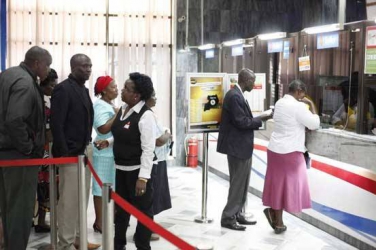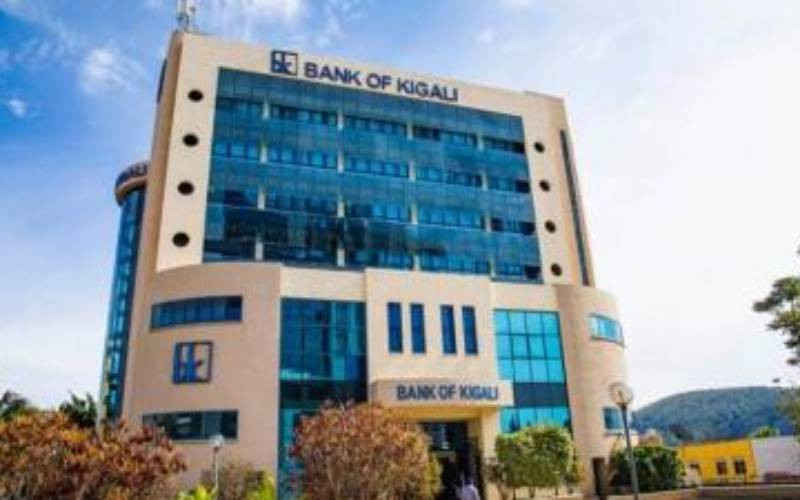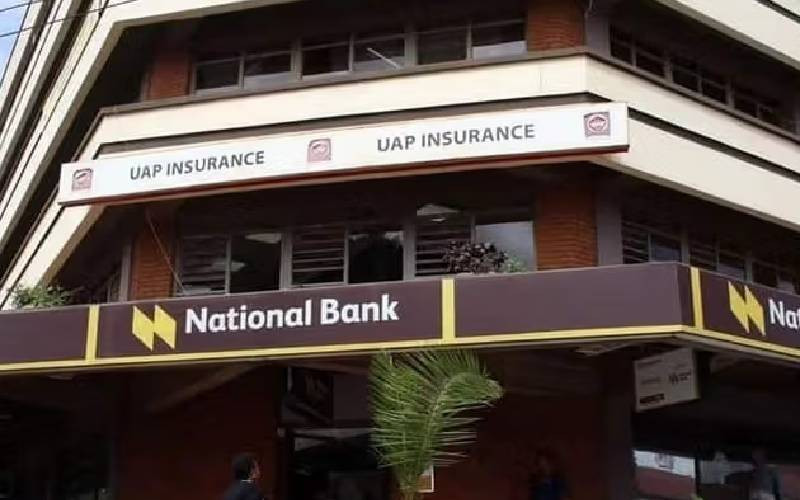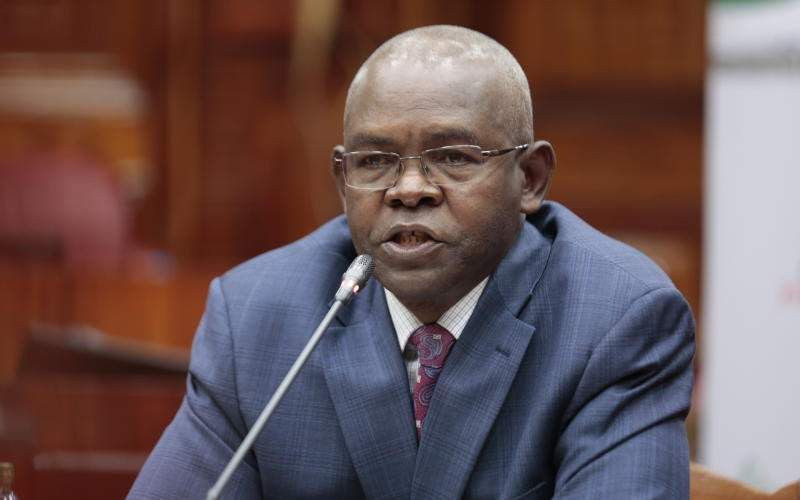
Post Bank headquarters banking hall PHOTO: WILBERFORCE OKWIRI?
NAIROBI, KENYA: Kenya’s bad debt has soared to Sh230 billion, a move that has seen banks cut lending, which grew at the slowest level ever of 2.3 per cent in May.
However, with the loan problem growing, lenders are grappling with huge debts that could slide into bad loans.
The situation brings into light weak controls and casual lending by banks, especially the big lenders that carry the bulk of the bad loans.
The loans were being offered for as low as seven per cent when ordinary borrowers were getting rates of as high as 20 per cent. A case in point is the I&M loan to Kenya Airways (KQ), most of which had no security.
Two corporates - Nakumatt and KQ - owe banks Sh31 billion in unsecured loans, with both struggling to pay.
“The challenge remains that credit pricing is practically infantile and name-based,” Rich Management Chief Executive Aly Khan-Satchu said.
“For a credit corporate bond market to lift off, we need to see better and more sophisticated credit-based pricing.”
The borrowers are not in a financial position to pay and are now asking the banks involved to either join the business or count their losses because they are literally struggling or insolvent.
Banks are resisting this move, saying it will set a bad precedent, where failing businesses will simply refuse to pay and ask for loan conversion into equity.
In the KQ case, one of the lenders has given a damning review of such a deal, saying it will see banks record losses and break Central Bank of Kenya (CBK) rules on capital ratios and liquidity levels. There is also little promise, the lender said, that the move will turn around the fortunes of the business.
“The impact of restructuring vary for each of the unsecured locals by banks and may lead to profit warnings for the listed financial institution. This may further lower the confidence in the bankingsystem,” said the bank in the confidential report.
The lender observed owning an airline would distort its business model since it never sought to own such a business. “Of course if they get some sort of haircut, it will impact their core capital.
But I think what is important here is that they have to make their decisions based on the information they have and the options that are there,” Central Bank of Kenya (CBK) Governor Dr Patrick Njoroge said at a recent press briefing.
Stay informed. Subscribe to our newsletter
CBK has in the past insisted that it would not give special treatment to banks entering debt swap deals in terms of capital ratios and classifying bad debts.
“Our consideration is the issue of sustainability of banks and that the limits we have set as the regulators are not violated, that is equity not exceeding 25 per cent of core capital. Loans have to be correctly classified so that appropriate risk classifications are done,” Dr Njoroge said.
According to Deepak Dave of Riverside Capital, a risk management firm, it’s unlikely for public firm deals to breach the limit. “For smaller firms, it’s quite possible. Bear in mind there is no regulatory or Capital Markets Authority (CMA) guidance on revaluation of the equity stake, how it gets counted against the bank’s own profits or capital, what the provisions for sale are and does equity re-evaluation count as a cost of interest?” he posed. The industry will be curious on how the KQ and Nakumatt deals will pan out to give clarity on how such restructuring will be done in future.
“The idea of debt or equity swaps seems to be running a little ahead of itself. Work remains for CBK and Treasury, as well as CMA, to make this a true solution towards solving our bad debt crisis,” Deepak said.
Mr Satchu, however, argues the consideration of bailing out failed corporates by lenders should be treated on a case-by-case basis - not an offer template for such deals.
“KQ was and is clearly anational interest issue. If we were not able to rescue the national carrier, we might as well as have kissed goodbye being the regional hub in East Africa,” he said.
He argued that the lenders were offering loans at a good rate of compensation while knowing all too well the risk of such loans. “Nakumatt is a private sector company as is TransCentury. I’m assuming banks that gave out loans were being richly recompensed for that risk. After all, Nakumatt was paying more than 20 per cent in the commercial paper markets. Twenty per cent-plus was indicative of the perceived credit risk,” he said.
Mr Satchu also faulted the KQ deal, noting that the government was giving lenders too much concessions. “The KQ rescue package as I have seen it appears to be handing the candy store to the banks. They lent money to KQ willingly. I am sure they were receiving adequate compensation for taking that risk. I am incredulous that the Government is seeking to hand them the keys in the proposed way,” he said.
Analysts further argue that this model may not be good for corporates as banks are being held hostage by bottom line pressure rather than investing in marketing or research and development.
“Bankers are not good owners. Their internal culture, regulatory paradigm and business model all are geared towards lending, not owning companies and certainly not operating the companies. So this new culture of debt-equity swaps looks like a solution, but is actually stoking up trouble,” said Mr Deepak.
“Banks find long-term investment into marketing, product development and research a waste of cash-flow, which is why companies where banks ended up as owners for more than a brief period often fall behind their competitors even if they manage to pay off the loans.”
Equity stakes
Head of Banking Research at Ecobank George Bodo said lenders, especially commercial banks cannot be in the business of converting loans into equity stakes.
“First, that’s not their core business and amounts to predatory lending. Second, it exposes their balance sheets to serious refinancing risks, and especially if the loans are foreign currency denominated. Finally, it exposes them to serious revaluation losses in cases where the lendee is a listed company such as KQ,” he said.
These revaluation losses can potentially shred their balance sheets,” said Mr Bodo. He further argued that the lenders would rather restructure such loans-through a mix of moratorium and maturity lengthening, sentiments shared by Satchu.
“Banks do not run businesses; they do not have the bandwidth or the mandate,” he said.
Nakumatt is currently also looking at the options of stretching maturity dates while KQ is offering an option where a loan cold be ring-fenced in a holding debt account, which will, however, pay a rate of one per cent annually and five per cent in the long run.
In normal cirmcustances, unsecured loans refer to contractual instances where a lender has not charged a loanee’s immovable assets by way of debentures of corporate or directors’ guarantees.
“However, lenders can still ring-fence their exposures by contractually domiciling cashflows, in which case the key success factor lies in enforcement,” said Mr Bodo.
Private equity firms
Mr Deepak for his part said debt-to-equity swaps would complicate lending, saying the Government should not encourage it. “Lending to a company has different motivations than owning one and this is often forgotten in the heat of battle when restructuring a complex firm,” he said.
“I fail to understand why regulators and the Government are actively encouraging the metamorphosis of our banks into private equity firms.”
But as debt-to-equity swap deals dominate the market, lenders may have to put more consideration when lending to corporates no matter how big their branding is.
Ecobank’s Mr Bodo meanwhile, said banks may be forced to revert to lending to such corporates in foreign currency where they still have a leverage of pricing unsecured products since the local currency-denominated loans are capped at 14 per cent regardless of the risks attached.
“TransCentury, KQ and Nakumatt financial crises certainly raise credit risks and could trigger an upward review in risk premium by corporate lenders. For commercial banks, upward review in risk premiums is only implementable in foreign currency lending,” he said.
Mr Deepak also said banks would need to start estimating the value of a businesses beyond their tangible assets.
This is tricky in our market given it is small, less liquid and under-developed for large-scale mergers and acquisitions.
“Estimating those values a part of unsecured deals will mean higher pricing (which is not allowed) or reducing even more the unsecured lending space (thus cutting off credit),” he said.
Mr Deepak, however, said what was needed was not for banks to be able to swap debt for equity, but for non-bank buyers to easily enter into such situations and have a standardised restructure model where there are structures for banks to sell such debt.
“This should be a parallel strategy. As far as I can tell only half the job is being done,” he said.
NAIROBI, KENYA: Kenya’s bad debt has soared to Sh230 billion, a move that has seen banks cut lending, which grew at the slowest level ever of 2.3 per cent in May.
However, with the loan problem growing, lenders are grappling with huge debts that could slide into bad loans.
The situation brings into light weak controls and casual lending by banks, especially the big lenders that carry the bulk of the bad loans.
The loans were being offered for as low as seven per cent when ordinary borrowers were getting rates of as high as 20 per cent. A case in point is the I&M loan to Kenya Airways (KQ), most of which had no security.
Two corporates - Nakumatt and KQ - owe banks Sh31 billion in unsecured loans, with both struggling to pay.
“The challenge remains that credit pricing is practically infantile and name-based,” Rich Management Chief Executive Aly Khan-Satchu said.
“For a credit corporate bond market to lift off, we need to see better and more sophisticated credit-based pricing.”
The borrowers are not in a financial position to pay and are now asking the banks involved to either join the business or count their losses because they are literally struggling or insolvent.
Banks are resisting this move, saying it will set a bad precedent, where failing businesses will simply refuse to pay and ask for loan conversion into equity.
In the KQ case, one of the lenders has given a damning review of such a deal, saying it will see banks record losses and break Central Bank of Kenya (CBK) rules on capital ratios and liquidity levels. There is also little promise, the lender said, that the move will turn around the fortunes of the business.
“The impact of restructuring vary for each of the unsecured locals by banks and may lead to profit warnings for the listed financial institution. This may further lower the confidence in the bankingsystem,” said the bank in the confidential report.
The lender observed owning an airline would distort its business model since it never sought to own such a business. “Of course if they get some sort of haircut, it will impact their core capital.
But I think what is important here is that they have to make their decisions based on the information they have and the options that are there,” Central Bank of Kenya (CBK) Governor Dr Patrick Njoroge said at a recent press briefing.
CBK has in the past insisted that it would not give special treatment to banks entering debt swap deals in terms of capital ratios and classifying bad debts.
“Our consideration is the issue of sustainability of banks and that the limits we have set as the regulators are not violated, that is equity not exceeding 25 per cent of core capital. Loans have to be correctly classified so that appropriate risk classifications are done,” Dr Njoroge said.
According to Deepak Dave of Riverside Capital, a risk management firm, it’s unlikely for public firm deals to breach the limit. “For smaller firms, it’s quite possible. Bear in mind there is no regulatory or Capital Markets Authority (CMA) guidance on revaluation of the equity stake, how it gets counted against the bank’s own profits or capital, what the provisions for sale are and does equity re-evaluation count as a cost of interest?” he posed. The industry will be curious on how the KQ and Nakumatt deals will pan out to give clarity on how such restructuring will be done in future.
“The idea of debt or equity swaps seems to be running a little ahead of itself. Work remains for CBK and Treasury, as well as CMA, to make this a true solution towards solving our bad debt crisis,” Deepak said.
Mr Satchu, however, argues the consideration of bailing out failed corporates by lenders should be treated on a case-by-case basis - not an offer template for such deals.
“KQ was and is clearly anational interest issue. If we were not able to rescue the national carrier, we might as well as have kissed goodbye being the regional hub in East Africa,” he said.
He argued that the lenders were offering loans at a good rate of compensation while knowing all too well the risk of such loans. “Nakumatt is a private sector company as is TransCentury. I’m assuming banks that gave out loans were being richly recompensed for that risk. After all, Nakumatt was paying more than 20 per cent in the commercial paper markets. Twenty per cent-plus was indicative of the perceived credit risk,” he said.
Mr Satchu also faulted the KQ deal, noting that the government was giving lenders too much concessions. “The KQ rescue package as I have seen it appears to be handing the candy store to the banks. They lent money to KQ willingly. I am sure they were receiving adequate compensation for taking that risk. I am incredulous that the Government is seeking to hand them the keys in the proposed way,” he said.
Analysts further argue that this model may not be good for corporates as banks are being held hostage by bottom line pressure rather than investing in marketing or research and development.
“Bankers are not good owners. Their internal culture, regulatory paradigm and business model all are geared towards lending, not owning companies and certainly not operating the companies. So this new culture of debt-equity swaps looks like a solution, but is actually stoking up trouble,” said Mr Deepak.
“Banks find long-term investment into marketing, product development and research a waste of cash-flow, which is why companies where banks ended up as owners for more than a brief period often fall behind their competitors even if they manage to pay off the loans.”
Equity stakes
Head of Banking Research at Ecobank George Bodo said lenders, especially commercial banks cannot be in the business of converting loans into equity stakes.
“First, that’s not their core business and amounts to predatory lending. Second, it exposes their balance sheets to serious refinancing risks, and especially if the loans are foreign currency denominated. Finally, it exposes them to serious revaluation losses in cases where the lendee is a listed company such as KQ,” he said.
These revaluation losses can potentially shred their balance sheets,” said Mr Bodo. He further argued that the lenders would rather restructure such loans-through a mix of moratorium and maturity lengthening, sentiments shared by Satchu.
“Banks do not run businesses; they do not have the bandwidth or the mandate,” he said.
Nakumatt is currently also looking at the options of stretching maturity dates while KQ is offering an option where a loan cold be ring-fenced in a holding debt account, which will, however, pay a rate of one per cent annually and five per cent in the long run.
In normal cirmcustances, unsecured loans refer to contractual instances where a lender has not charged a loanee’s immovable assets by way of debentures of corporate or directors’ guarantees.
“However, lenders can still ring-fence their exposures by contractually domiciling cashflows, in which case the key success factor lies in enforcement,” said Mr Bodo.
Private equity firms
Mr Deepak for his part said debt-to-equity swaps would complicate lending, saying the Government should not encourage it. “Lending to a company has different motivations than owning one and this is often forgotten in the heat of battle when restructuring a complex firm,” he said.
“I fail to understand why regulators and the Government are actively encouraging the metamorphosis of our banks into private equity firms.”
But as debt-to-equity swap deals dominate the market, lenders may have to put more consideration when lending to corporates no matter how big their branding is.
Ecobank’s Mr Bodo meanwhile, said banks may be forced to revert to lending to such corporates in foreign currency where they still have a leverage of pricing unsecured products since the local currency-denominated loans are capped at 14 per cent regardless of the risks attached.
“TransCentury, KQ and Nakumatt financial crises certainly raise credit risks and could trigger an upward review in risk premium by corporate lenders. For commercial banks, upward review in risk premiums is only implementable in foreign currency lending,” he said.
Mr Deepak also said banks would need to start estimating the value of a businesses beyond their tangible assets.
This is tricky in our market given it is small, less liquid and under-developed for large-scale mergers and acquisitions.
“Estimating those values a part of unsecured deals will mean higher pricing (which is not allowed) or reducing even more the unsecured lending space (thus cutting off credit),” he said.
Mr Deepak, however, said what was needed was not for banks to be able to swap debt for equity, but for non-bank buyers to easily enter into such situations and have a standardised restructure model where there are structures for banks to sell such debt.
“This should be a parallel strategy. As far as I can tell only half the job is being done,” he said.
 The Standard Group Plc is a
multi-media organization with investments in media platforms spanning newspaper
print operations, television, radio broadcasting, digital and online services. The
Standard Group is recognized as a leading multi-media house in Kenya with a key
influence in matters of national and international interest.
The Standard Group Plc is a
multi-media organization with investments in media platforms spanning newspaper
print operations, television, radio broadcasting, digital and online services. The
Standard Group is recognized as a leading multi-media house in Kenya with a key
influence in matters of national and international interest.
 The Standard Group Plc is a
multi-media organization with investments in media platforms spanning newspaper
print operations, television, radio broadcasting, digital and online services. The
Standard Group is recognized as a leading multi-media house in Kenya with a key
influence in matters of national and international interest.
The Standard Group Plc is a
multi-media organization with investments in media platforms spanning newspaper
print operations, television, radio broadcasting, digital and online services. The
Standard Group is recognized as a leading multi-media house in Kenya with a key
influence in matters of national and international interest.









